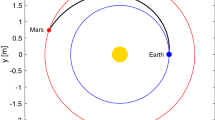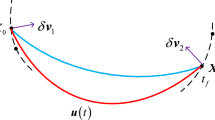Abstract
This article explores the application of the Legendre pseudospectral method to aerospace vehicle orbital transfer with a problem of finite thrust optimization. Firstly, the model of the orbital transfer optimization control problem was originated, while the equations of motion are derived from some simplifying assumptions. For maximum control of accumulated fuel consumption, the performance was optimized. The variable of control was the attack angle of thrust, and the variable of terminal condition constraints included path angle, altitude, and velocity constraints. Next, the Legendre pseudospectral method which was used to transform the optimal control problem into NLP (Nonlinear Programming) problem. The transformation of the problem was realized from dynamic optimization to quiescent parameter majorization. The variables of state and control were used as the optimal parameters for all collocation nodes. Lastly, SNOPT software package was selected as the solution to the parameter optimization problem. The SNOPT software package shows high convergence for a nonlinear programming problem. During the simulation, it was noted that the Legendre pseudospectral method is insensitive to orbital transfer initial prerequisites. It was also observed that the optimal solutions to the orbital transfer optimization problem are relatively excellent in robustness. Therefore, Legendre pseudospectral method is a feasible approach to the aerospace vehicle orbital transfer with a finite thrust optimization problem. The orbit optimization method proposed in this paper can also provide reference and guidance for solving other interplanetary orbital transfer optimization problems.
Access this chapter
Tax calculation will be finalised at checkout
Purchases are for personal use only
Similar content being viewed by others
References
Widhalm, J.W., Heise, S.A.: Optimal in-plane orbital evasive maneuvers using continuous low thrust propulsion. J. Guid. Control. Dyn. 14(6), 1323–1326 (1991)
Sullivan, C.J., Bosanac, N.: Using reinforcement learning to design a low-thrust approach into a periodic orbit in a multi-body system. In: AIAA Scitech 2020 Forum, p. 1914. AIAA, Orlando (2020)
Petukhov, V.G.: Application of the angular independent variable and its regularizing transformation in the problems of optimizing low-thrust trajectories. Cosm. Res. 57(5), 351–363 (2019)
Thorne, J.D., Hall, C.D.: Minimum-time continuous-thrust orbit transfer. J. Astronaut. Sci. 45(4), 411–432 (1997)
Tarzi, Z., Speyer, J., Wirz, R.: Fuel optimum low-thrust elliptic transfer using numerical averaging. Acta Astronaut. 86, 95–118 (2013)
Caillau, J.B., Farrés, A.: On local optima in minimum time control of the restricted three-body problem. Recent Adv. Celestial Space Mechanics 23, 209–302 (2016)
Mahdi, F., Sahar, S., Majid, B.: Investigation of low thrust optimal orbital transfer from LEO to GEO considering circular orbits. J. Astronautical Sci. 67(1), 77–97 (2020)
Gu, D.K.: Optimal orbital transfer design of space vehicle by finite thrust. Electric Machines Control 15(8), 88–92 (2011)
Han, W.H., Gan, Q.B., et al.: Comprehensive optimization for orbit transfer and rendezvous of finite thrust with perturbation. Systems Eng. Electr. 35(7), 1486–1491 (2013)
Liang, X.G., Yang, D.: Applying nonlinear programming to solve nonplanar optimal orbital transfer problem. J. Astronautics 27(3), 363–368 (2006)
Duan, C.H., Ren, L.X., et al.: All-electric propulsion satellite trajectory optimization by homotopic approach. Chinese Space Sci. Technol. 40(2), 42–48 (2020)
Rust, J.W.: Fuel optimal low thrust trajectories for an asteroid sample return mission, Master’s thesis, California: Naval Postgraduate School (2005)
Fahroo, F., Ross, I.M.: Direct trajectory optimization by a Chebyshev pseudospectral method. J. Guid. Control. Dyn. 25(1), 160–166 (2002)
Shawn, E.G., Victor, M.P., et al.: SNOPT-MATLAB driver manual. University of Notre Dame Press, Indiana (2000)
Author information
Authors and Affiliations
Corresponding author
Editor information
Editors and Affiliations
Rights and permissions
Copyright information
© 2023 The Author(s), under exclusive license to Springer Nature Singapore Pte Ltd.
About this paper
Cite this paper
Tu, L., Yan, C., Wang, Y., Yang, Y. (2023). Improving Design of Aerospace Vehicle Orbital Transfer Optimization with Finite Thrust Based on Legendre Pseudospectral Method. In: Yan, L., Duan, H., Deng, Y. (eds) Advances in Guidance, Navigation and Control. ICGNC 2022. Lecture Notes in Electrical Engineering, vol 845. Springer, Singapore. https://doi.org/10.1007/978-981-19-6613-2_8
Download citation
DOI: https://doi.org/10.1007/978-981-19-6613-2_8
Published:
Publisher Name: Springer, Singapore
Print ISBN: 978-981-19-6612-5
Online ISBN: 978-981-19-6613-2
eBook Packages: Intelligent Technologies and RoboticsIntelligent Technologies and Robotics (R0)




